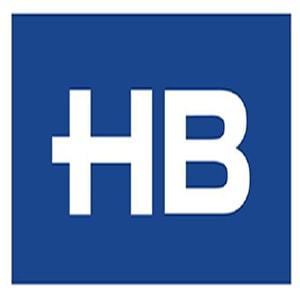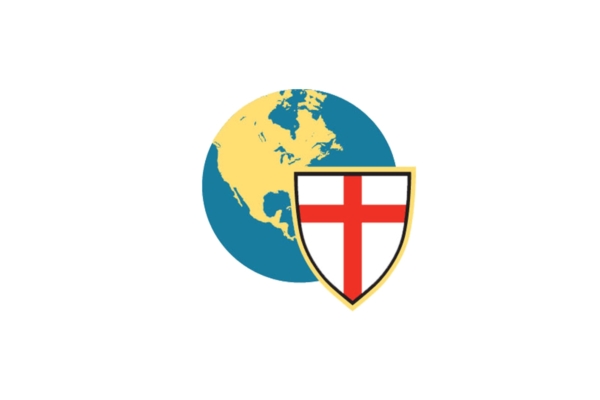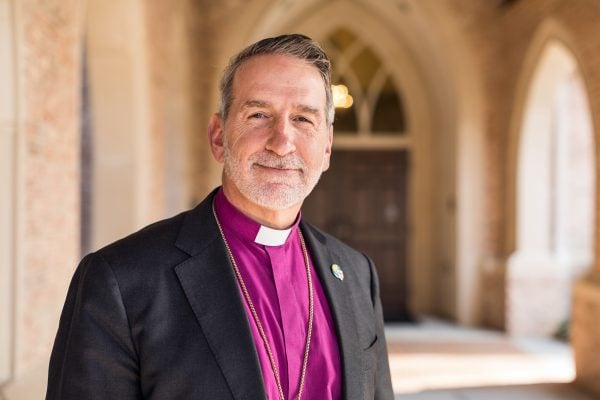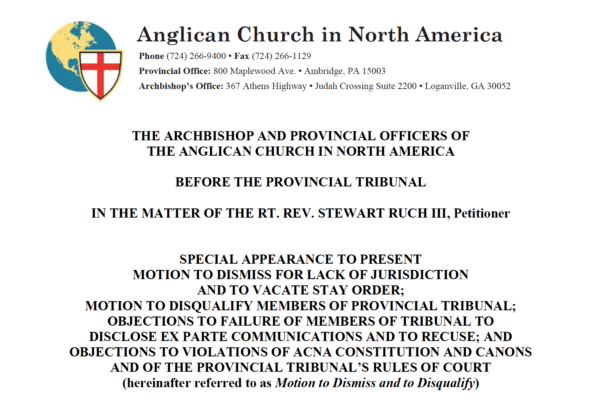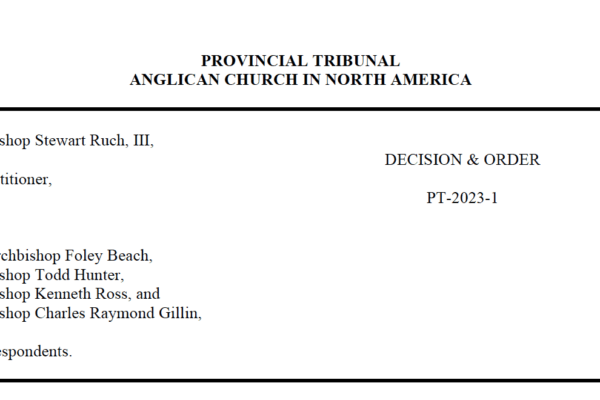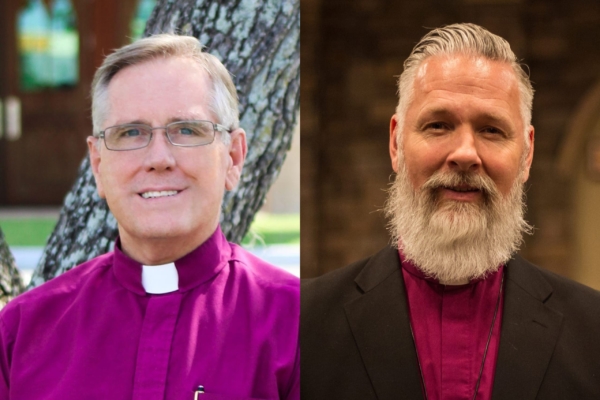Diocese of the Upper Midwest Investigations
The Province is committed to seeking justice for any acts of abuse. We will not shield anyone who has committed abuse or engaged in misconduct from the scrutiny of an impartial and objective investigation that seeks the truth. Our great desire is that the Anglican Church in North America will be a safe place for adults and children, the broken-hearted and the vulnerable.
If you know or suspect a minor or vulnerable adult is in imminent danger, please call 911 immediately.
If you have experienced sexual abuse by a clergy person, lay leader, or volunteer in the Diocese of the Upper Midwest, we encourage you to make a report directly to local law enforcement and/or child protective services.
Those who wish to participate in the investigation into sexual abuse or sexual misconduct claims and the handling of those claims by leaders within the Diocese of the Upper Midwest can contact Husch Blackwell at ACNA.Independent.Investigation@huschblackwell.com.
Those who have claims of abuse of ecclesiastical (i.e. church) power within the Diocese of the Upper Midwest unrelated to sexual abuse or sexual misconduct claims can contact Telios Law Firm at ACNA@telioslaw.com.
If you are unsure of which firm to contact, call our confidential support hotline Monday through Saturday, 8am – 5pm CST at 724-252-5635.
How do I report misconduct in another diocese?
If you know or suspect a minor or vulnerable adult is in imminent danger, please call 911 immediately.
If you have experienced sexual abuse by a clergy person, lay leader, or volunteer, we encourage you to make a report directly to local law enforcement and/or child protective services.
If you have a misconduct claim against a priest or deacon, please contact the bishop, chancellor, or standing committee of the priest or deacon’s diocese. You can find a list of contact information for each diocese here.
If you have a misconduct claim against a bishop, please email misconduct@anglicanchurch.net and a provincial representative will be in touch with you. This is a safe, confidential, and secure inbox to contact.
Is financial assistance available for survivor care?
Yes, a survivor care fund has been set up by the Province to provide financial assistance for counseling for those who are direct victims of sexual abuse by Mark Rivera. Please email SurvivorCareFund@anglicanchurch.net to apply for this financial support. These funds are also administered by outside contract agencies.
Can you tell me about Husch Blackwell?
Husch Blackwell was vetted by the Provincial Response Team (PRT) and selected by the unanimous vote of the PRT and the majority of survivors who voted.
Husch Blackwell’s experience includes sexual assault investigations on scores of college campuses over the past 10 years, K‐12 sexual misconduct investigations involving minors, and investigations of sexual abuse allegations within various religious environments (some involving minors as well). Notably, Husch Blackwell is a nationally recognized provider of training and legal services in the area of preventing and addressing sexual misconduct, and they are regularly asked to present and speak about these issues across the country.
The Husch Blackwell team includes men and women and is trauma-informed. They seek to provide survivor complainants with information about the process, acknowledge the challenges in describing the sensitive experiences of those traumatized, and provide options to tailor the interview environment to the alleged survivor’s needs to maximize their sense of safety while sharing their story, without compromising the fact‐finding goals. They will conduct interviews with a posture of patience, expressing compassion and empathy without sacrificing neutrality, and asking non-leading and clarifying questions.
How is Husch Blackwell handling confidentiality?
Confusion exists about how the current investigations are balancing confidentiality and due process. Investigations can benefit from receiving confidential disclosures, but there is a limit to how confidential information can be used in a potential future canonical process. Such processes give an accused the right to know the allegations against them which may require the inclusion of names and identifying information. Good investigations balance these dual objectives. At the request of some survivors, adjustments were made to reassure those considering whether to participate in the process. In early April, the Province asked Husch Blackwell to clarify confidentiality and, when requested, anonymity. Since then, Husch Blackwell has been communicating the following to those who come forward to participate:
Thank you very much for your inquiry about confidentiality and the extent to which your name or the information you disclose to us may be shared with others outside of our team at Husch Blackwell. We are extremely careful about confidentiality and privacy with respect to people who talk with us. The public report, by contract, will not include names or identifying information. A version of the report with unredacted names and information of those willing to participate in any disciplinary or other processes moving forward will be provided to the Provincial Investigative Team (see names here) who will keep the information in confidence to the greatest extent legally and canonically possible.
Provincial leadership understands the desire for anonymity and the choice that some victims and witnesses may make to remain anonymous beyond interactions with our team. For anyone who chooses this option, we will not share their name or identifying information about them with anyone outside of our Husch Blackwell team. Due to the realities of investigative processes, however, an individual’s decision to choose complete anonymity will limit the extent to which the information disclosed can be used in our investigative work. Further, the Church – whether the Province or the Diocese – cannot use anonymous information or accusations as a basis for disciplinary action against its clergy. Anyone choosing to remain completely anonymous should understand the limited extent to which our Husch Blackwell team or the Church could act upon the information they share with us.
Can you tell me about Telios Law?
Beyond the scope of the PRT, the Province has hired Telios Law to help investigate allegations of abuse of ecclesiastical power by leaders in the Diocese of the Upper Midwest.
Telios Law, founded by Theresa Sidebotham, advises organizations in the U.S. and internationally, with a focus on religious and nonprofit law. Theresa advises on numerous misconduct investigations including child abuse and workplace misconduct, within and outside of religious settings. She also created Telios Teaches to provide online training for ministries aimed at preventing child abuse and toxic work cultures.
Rooted in the belief that legal solutions should bring healing and life, Telios Law staff strive to support, confront, and restore the spiritual health of the ministries they serve. They recognize that toxic abuses of power can leave people traumatized and divided, morals compromised, and the truth lost. Abuse or misconduct in ministry workplaces can cause a myriad of harms including spiritual, emotional, and physical trauma.
Telios Law staff believe that those who have been harmed should have their stories heard in a caring and compassionate space, as a first step to healing. By actively seeking the truth and bringing forward the stories of those who have been harmed, Telios Law investigations help organizations create and maintain a safe work culture where misconduct is vigorously addressed without partiality or retaliation. Telios Law believes that well-conducted investigations can bring healing to those who have been harmed and help organizations grow spiritually. To accomplish this, Telios Law uses current investigative best practices, works with psychologists and other expert consultants to adequately support those who have been harmed, and takes into account the effects of trauma and evidence-based practices. The ultimate goals of an investigation are to uncover truth, seek healing for those who have been harmed, and provide an opportunity for reconciliation.
How is Telios Law handling confidentiality?
A private investigation balances uncovering information and protecting confidentiality. In some contexts, such as a workplace investigation of sexual harassment, complete confidentiality of a report or testimony may not be possible because the organization has a duty to follow up on reports. In other contexts, it can be offered.
How anonymity works in the ACNA investigation
In the ACNA investigation, Telios Law is able to offer levels of confidentiality of testimony. This can include having one’s name coded in the Report to the Province, or not sharing one’s name with other witnesses, which includes not sharing testimony if it could have come only from that individual. Anonymity in the investigation also has certain implications. If a person has brought forward allegations of abuse or is a witness to abuse, we can follow up on these allegations more effectively if we can openly share the person’s name during the investigation. If we cannot recount certain factual circumstances to others, especially to those accused, it is unlikely that we can substantiate or corroborate them. If a person chooses to remain anonymous, it will likely affect the investigators’ ability to uncover information and properly follow through with their allegations. If canonical proceedings are proposed, witnesses cannot participate and remain anonymous. The information can be used as background information, however.
Limitations to anonymity
Telios Law works hard to protect each witness’s specific request for anonymity and keep their names as witnesses and testimony confidential. But that doesn’t necessarily include what other people may say about a witness, or information in documents. For instance, if a non-anonymous witness brings up the name of an individual who has requested anonymity, the non-anonymous witness’s statement is not confidential and therefore the name of the anonymous individual in this context is not confidential. The function of anonymity is to keep confidential the person’s identity as a witness and what they have said, not their existence or circumstances as described by others.
Additionally, some people are not eligible for anonymity, such as those accused of wrongdoing who are being investigated. Individuals sometimes choose to make statements of facts or accusations on public forums like Twitter or Facebook. Public statements are not confidential. Thus, an individual, whether they are a witness or not, and whether they request anonymity or not, who makes public posts is subject to have their public posts included in the Report and be evaluated just as any non-anonymous witness.
Evaluating credibility
Investigators have several ways to evaluate credibility, including a direct evaluation of the person during an interview, evaluating their statements based on documentary evidence, comparing their statements with those of others, and evaluating their possible bias.
Another tool that Telios Law uses is a credibility inquiry in which witnesses are asked to rate the credibility of various individuals on a scale of 1 to 5. These numbers are aggregated. Evidentiary rules in our legal system have always considered a person’s reputation for credibility or truthfulness to be important, and this approach is based on that concept.
The credibility inquiry assists the investigators in evaluating bias, personal opinions, credibility, and reputation for honesty or exaggeration. As explained to all witnesses, individuals included on this broad list are not necessarily other witnesses to the case but may also be individuals who have been mentioned in some way. They may or may not even be involved directly. Witnesses who request anonymity may have their names left off the list, either entirely or for particular interviews, depending on the nature of their request. (Of course, this adds to the difficulty of corroborating the testimony of anonymous witnesses.) If the same witness speaks openly online, the online statements are not confidential and therefore the anonymous witness is subject to the same credibility determinations as any other witness.
While the credibility inquiry is not a scientific measure, it is useful in several ways. It provides information about a person’s reputation for credibility. It provides information as to whether the person doing the rating seems to be biased. A potential drawback is whether a person is evaluated by more people on one “side” than the other, so that also has to be taken into account, particularly in situations where there is high conflict between groups of people. If used carefully, it is a helpful tool.
Can you tell me more about the support hotline?
If you are unsure of which firm to contact, please call our confidential support hotline at 724-252-5635. This hotline, open from Monday through Saturday, 8 am to 5 pm (CST), is staffed by a qualified female support coordinator who is an outside contractor, not affiliated with the Anglican Church in North America.
She can also refer a caller needing assistance to professionals outside of the Anglican Church in North America system (e.g. Rape Abuse and Incest National Network [RAINN], Childhelp National Child Abuse Hotline) including any relevant government authorities.
Will the Province use these firms for any litigation purposes related to this matter?
Neither Husch Blackwell nor Telios Law will represent in litigation related to this matter the Province, the Diocese of the Upper Midwest, leaders and members of the Diocese, any alleged survivors, or witnesses.
Are the firms committed to not interfering with any current pending criminal or civil cases?
Yes. The firms will prioritize protecting the integrity of any criminal or civil processes involving survivors.
Who will release the public report from Husch Blackwell?
Our contract with Husch Blackwell stipulates the release of a “full public report that redacts names and identifying details to protect survivors and witnesses as appropriate.” Husch Blackwell will release the report, and it will be relayed by the Anglican Church in North America through public communication channels upon reception.
What is the status of the Provincial Response Team?
With the public launch of the investigation and the establishment of the survivor care fund, the Provincial Response Team (PRT) has notified the Executive Committee that it has concluded its work.
Who will carry on the work of the Province in this matter?
Going forward, the Executive Committee has formed a Provincial Investigative Team to oversee this portion of the full investigative process. During the abuse of ecclesiastical power investigation, this team will assist, as needed, the investigators at Telios Law as consultants with matters including canon law, Anglican governance norms, and theology.
The Provincial Investigative Team will make recommendations for potential canonical charges (see ACNA Constitution and Canons Title IV).
Who is on the Provincial Investigative Team for the Diocese of the Upper Midwest?
Rev. Travis Boline, Officer of the ACNA Provincial Council
Elizabeth Conkle, member of the ACNA Executive Committee
Rev. Chris Culpepper, member of the ACNA Executive Committee
Alan Runyan, Esq., Anglican Diocese of South Carolina
Theresa Sidebotham, Esq., Telios Law
Rev. Lisa Schwandt, member of the ACNA Executive Committee
Is this the same Provincial Investigative Team that is looking into allegations made against Bishop Atkinson?
No, a different Provincial Investigative Team is looking into the allegations against Bishop Atkinson. You can learn more about that situation here.
Is a leave of absence an admission of guilt?
No, a leave of absence provides space for a proper investigation to be conducted.
How long will the investigation take?
We don’t know.
